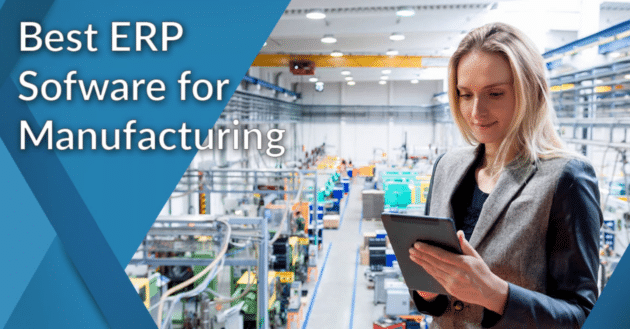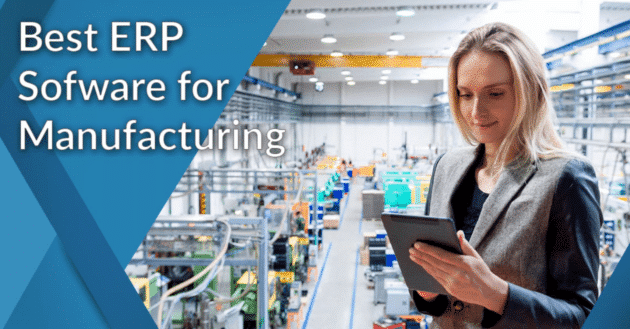Understanding Manufacturing ERP Software: Revolutionizing the Production Process – In today’s fast-paced and highly competitive manufacturing environment, companies must leverage technology to enhance operational efficiency, improve product quality, and reduce costs. One of the most transformative technologies in this regard is Manufacturing ERP (Enterprise Resource Planning) software. This comprehensive solution integrates various business processes, offering a single source of truth that streamlines operations, enhances collaboration, and drives productivity.
This article explores what Manufacturing ERP software is, its key features, its benefits, and how it can revolutionize your manufacturing operations.

What is Manufacturing ERP Software?
Manufacturing ERP software is a specialized enterprise resource planning software tailored to the manufacturing sector. Unlike generic ERP solutions, which may encompass a broad range of business functions across industries, manufacturing ERP focuses on manufacturers’ unique challenges and requirements.
This software integrates all facets of production management, from procurement and inventory management to production planning and quality control, into a single platform. By centralizing data and processes, manufacturing ERP helps organizations enhance visibility, optimize resource utilization, and respond quickly to market demands.
Key Features of Manufacturing ERP Software
- Production Planning and Scheduling: Manufacturing ERP software allows companies to create detailed production plans based on demand forecasts. It facilitates effective resource and equipment scheduling, ensuring that production runs smoothly and efficiently. Advanced planning tools help minimize downtime, reduce lead times, and optimize production workflows.
- Inventory Management: Effective inventory management is crucial for manufacturers to avoid stockouts or excess inventory. Manufacturing ERP systems provide real-time visibility into inventory levels, enabling companies to track raw materials, work-in-progress, and finished goods. This feature helps manufacturers optimize inventory levels, reduce carrying costs, and improve order fulfillment rates.
- Supply Chain Management: Manufacturing ERP software integrates with suppliers and logistics providers, streamlining the supply chain process. Companies can track supplier performance, manage purchase orders, and monitor inbound shipments. This integration enhances supplier collaboration, reduces lead times, and improves supply chain efficiency.
- Quality Control: Maintaining product quality is essential for manufacturing success. ERP systems include quality control features that allow manufacturers to set quality standards, conduct inspections, and track non-conformance issues. Manufacturers can ensure compliance with industry standards and minimize defects by implementing quality management processes within the ERP system.
- Financial Management: Manufacturing ERP software integrates financial management functions, such as budgeting, forecasting, and accounting, into the manufacturing process. This feature provides manufacturers with accurate financial data, enabling better decision-making and improved economic performance.
- Data Analytics and Reporting: Manufacturing ERP software generates comprehensive reports and analytics that provide insights into key performance indicators (KPIs). Businesses can track production efficiency, inventory turnover, order fulfillment rates, and other critical metrics. This data-driven approach enables organizations to identify areas for improvement and make informed decisions.
- Human Resource Management: Managing a skilled workforce is vital for manufacturing operations. ERP software often includes HR management features that facilitate employee scheduling, training, and performance tracking. This helps manufacturers optimize labor utilization and ensure a skilled workforce.
- Customization and Scalability: Every manufacturing business has unique processes and requirements. The best manufacturing ERP systems offer customization options, allowing businesses to tailor the software to their needs. Additionally, these systems are scalable, accommodating growth as the company expands.
Benefits of Manufacturing ERP Software
- Improved Efficiency: Manufacturing ERP software enhances overall operational efficiency by automating routine tasks and streamlining processes. Organizations can minimize manual data entry, reduce errors, and optimize resource allocation, leading to faster production cycles and increased productivity.
- Enhanced Collaboration: A centralized platform fosters collaboration among departments, including production, finance, and supply chain. Employees can access real-time data and share insights, breaking down silos and promoting teamwork across the organization.
- Informed Decision-Making: Manufacturing ERP software provides comprehensive analytics and reporting capabilities that enable informed decision-making. Leaders can access real-time data to evaluate performance, identify trends, and make strategic decisions that drive growth.
- Cost Reduction: Manufacturing ERP software helps organizations lower operational costs by optimizing inventory levels, improving production scheduling, and reducing waste. Businesses can also benefit from better supplier management and negotiation, resulting in cost savings throughout the supply chain.
- Regulatory Compliance: Many manufacturing industries are subject to strict regulations and standards. Manufacturing ERP software includes compliance management features that help organizations adhere to industry regulations, maintain documentation, and efficiently conduct audits.
- Better Customer Service: Manufacturing ERP software improves order tracking, inventory management, and production scheduling, enabling businesses to fulfill customer orders more accurately and promptly. This leads to higher customer satisfaction and loyalty.
Choosing the Right Manufacturing ERP Software
When selecting a manufacturing ERP solution, organizations should consider several factors to ensure the software aligns with their specific needs:
- Industry-Specific Features: Look for an ERP system that offers functionalities tailored to the unique requirements of your manufacturing sector, whether it’s discrete manufacturing, process manufacturing, or make-to-order production.
- Ease of Use: The software should have an intuitive interface that allows users to navigate easily. A user-friendly system reduces the learning curve and promotes quicker adoption among employees.
- Integration Capabilities: Ensure the ERP software manufactured can integrate with existing systems and technologies. This will allow for seamless data sharing and reduce disruptions during implementation.
- Vendor Support and Training: Choose a vendor that provides comprehensive support, training, and resources to help your organization maximize the software’s potential. A robust support system is essential for troubleshooting and continuous improvement.
- Scalability: Consider your organization’s long-term growth. The manufacturing ERP software should be scalable, allowing you to add new functionalities and users as your business expands.
- Cost: Evaluate the total cost of ownership, including implementation, licensing, and ongoing maintenance fees. While the initial investment is significant, consider the software’s potential ROI and long-term benefits.
Popular Manufacturing ERP Software Solutions
Several manufacturing ERP software solutions are well-regarded in the industry for their robust features and capabilities. Here are some of the most popular options:
- SAP S/4HANA: SAP S/4HANA is a leading ERP solution known for its comprehensive functionality and scalability. It offers advanced manufacturing, supply chain management, and financial features, making it suitable for large enterprises.
- Microsoft Dynamics 365 Business Central: This cloud-based ERP solution provides many tools for small to mid-sized manufacturers. It includes features for production management, inventory control, and financial reporting, all integrated into one platform.
- Oracle NetSuite: Oracle NetSuite is a cloud-based ERP solution for growing manufacturing businesses. It offers advanced inventory management, order processing, supply chain capabilities, and real-time financial performance visibility.
- Infor CloudSuite Industrial (SyteLine): Infor CloudSuite Industrial is tailored specifically for manufacturers. It offers industry-specific functionalities such as production planning, inventory management, and quality control. Its cloud-based model enables accessibility from anywhere.
- Epicor ERP: Epicor is designed for manufacturing organizations of all sizes. It offers tools for production scheduling, supply chain management, and financial management, focusing on flexibility and customization.
- Acumatica Cloud ERP: Acumatica provides a cloud-based ERP solution with a user-friendly interface. Its manufacturing features include inventory management, production planning, and financial reporting, all accessible from any device.
Conclusion
Leveraging technology is crucial for maintaining a competitive edge in the ever-evolving landscape of manufacturing. Manufacturing ERP software offers a comprehensive solution that integrates key business processes, enhances collaboration, and drives efficiency. By providing real-time insights and automation capabilities, this software empowers manufacturers to make informed decisions, reduce costs, and improve overall productivity.
Investing in the right manufacturing ERP software can transform your operations, enabling you to adapt to changing market demands, enhance product quality, and achieve sustainable growth. Whether you’re a small manufacturer or a large enterprise, the right ERP solution can pave the way for success in today’s dynamic manufacturing environment.

